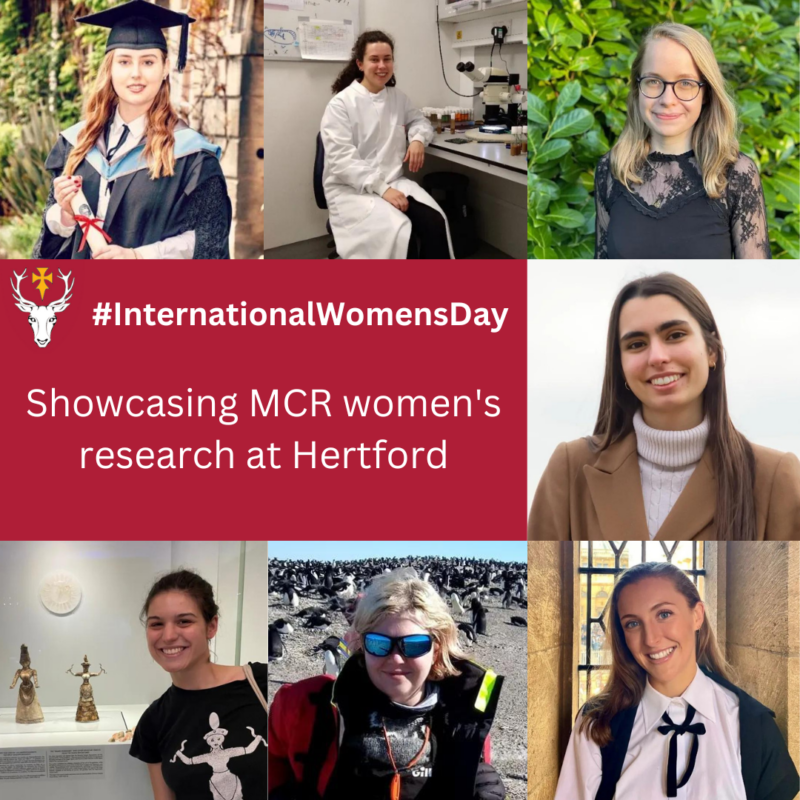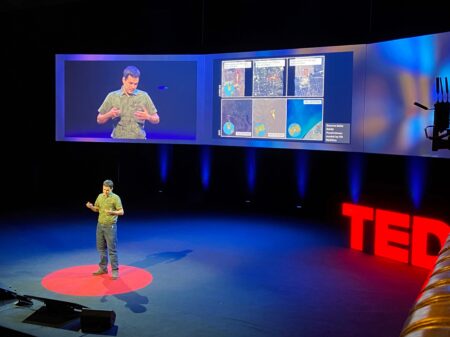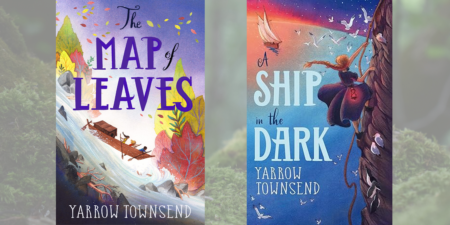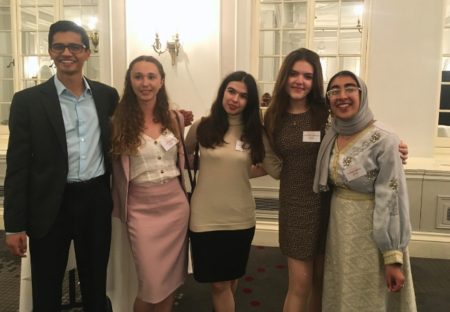Emma Ford
MCR President, Hertford College, NERC UKRI Environmental Research Scholar Sub-Department of Atmospheric, Oceanic & Planetary Physics. Department of Physics, University of Oxford
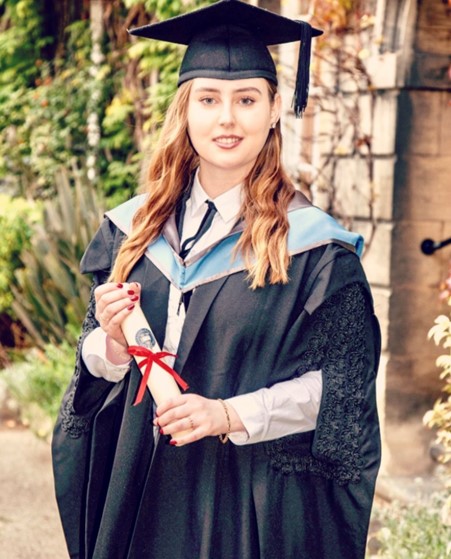
My name is Emma and at Hertford, you might know me from one of the many MCR events, but I am here today to tell you about my academic background and research. I have a BEng in Civil Engineering with a focus on water engineering. This involved the study of hydraulics and water quality and engineering design of the urban environment incorporating nature-based solutions. Nature-based solutions are man-made infrastructure which utilise natural processes to improve water quality and reduce flood impacts. For my undergraduate dissertation I studied the performance of lab-based sphagnum peat moss columns as nature-based solutions for treating wastewater and urban-runoff to improve environmental water quality. I specifically studied the removal performance for heavy metal and nutrients, which can be toxic to the environment and aquatic life.
I also completed a year in industry, working for a water company testing a variety of water quality treatment methods and working on a coastal flood defence scheme. My love for water science drove me to apply for the MSc in Water Science, Policy and Management at the University of Oxford, which I completed in 2021. For my MSc thesis, I tested a real urban environment nature-based solution system implemented on the land around Salmons Brook, a tributary of the Thames in London, which was heavily polluted. Over a series of ten-weeks, I collected samples at the inlet and outlet of reedbeds, constructed wetlands and other nature-based solutions in this area and then tested them in the lab for heavy metal and nutrient removal.
After completing my MSc, I now am a DPhil student on the NERC DTP Environmental Research course at the University of Oxford. This course involved an initial advanced training year, allowing me to take courses in atmospheric science, physics and coding. Whilst I am no longer studying water quality, I am still studying water, just in a different way. My DPhil research focuses on hydro-climate extremes, extreme events involving water, such as intense precipitation and storms which trigger flood events. I extract, manipulate and visualise earth observation data to understand extreme events and what triggers them. I am using python to carry out this work, and learning to code has definitely been a steep learning curve! If you want to talk about anything water-based, please do reach out to me!
Lara Bampfield
Hertford College, MCR Social Secretary, DPhil in Assyriology, University of Oxford
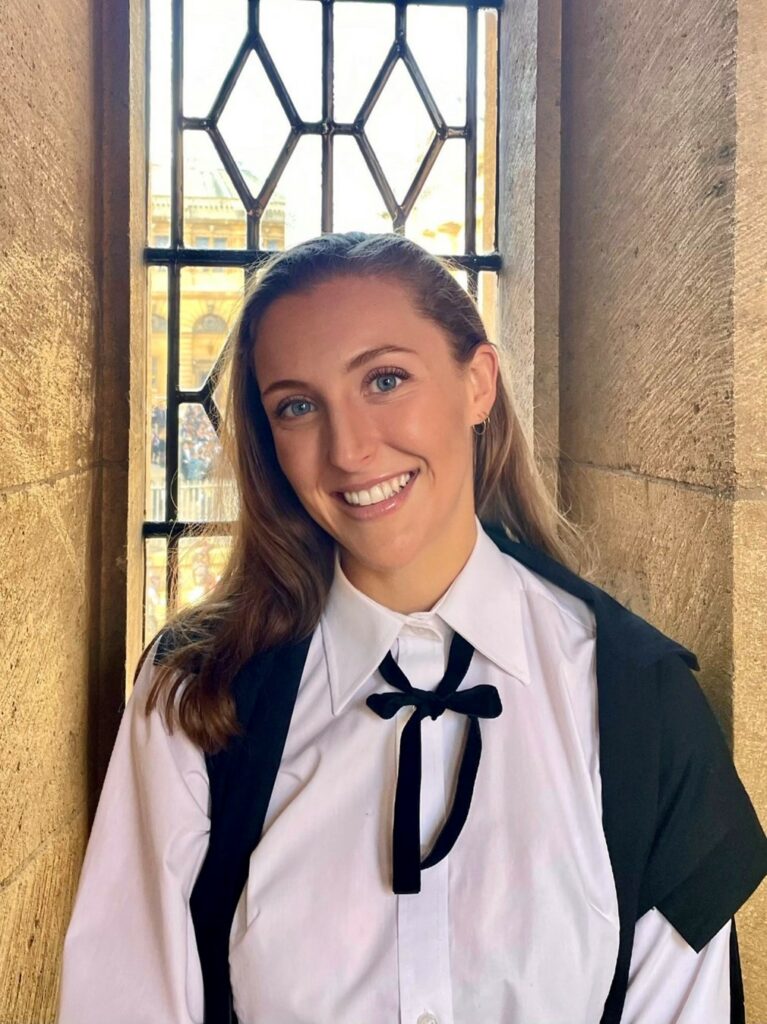
My academic work focuses on Old Babylonian (2000–1600 B.C.) and Kassite (1500–1300 B.C.) cylinder seals. Cylinder seals are cylinder-shaped craved pieces of rock or mineral, occasionally ivory, faience, or glass. The earliest examples with archaeological context came from Susa around 3500 B.C. and were primarily used to seal doors and jars as part of a process marking authority; the advent of writing expanded their uses and applications. This included serving as administrative tools and authentication mechanisms. They were impressed on clay tablets or other objects to verify the content or as a signature. I am investigating the textual and visual representation on cylinder seals and how the selection of these features and materials can inform us about the culture and society of the Mesopotamians during the Middle Bronze Age. OB and Kassite seals appear to represent two distinct classes of objects, which have been defined and catalogued by scholars based on a well-defined set of criteria. Recent archaeological and textual discoveries related to the so-called Sealand Dynasty, which occurred between the OB and Kassite periods, suggest that traditional notions of major political, social, and economic changes at this time may not be accurate; therefore, the investigation of the choices of image, text, colour, and material for cylinder seals in the two periods has the potential to shed light on this transitional period.
Digital technologies provide museums with significant opportunities to learn more about their visitors, experiment with their collection data, and alter the public’s perception of museums. The cylinder seal, as a multifaceted artefact, is significant to numerous branches of Assyriology. Photographs, sketches, and plaster rollouts are examples of conventional techniques that can be used to document these objects. These methods are inadequate for depicting cylinder seals because they provide limited information about the material and shape of the seal. Therefore, my research will employ an innovative digital method that permits greater clarity of the seals than traditional documentation techniques. Importantly, digital approaches provide a rapid means of comparing seal designs and content, enabling the identification of complex relationships between image, text, material, and internal arrangement.
My research will incorporate photogrammetry, UV unwrapping, AI, 3D models, and image annotation. All programmes will be designed specifically for cultural heritage and will be open source, allowing others to view and build upon the data initially entered for this study. By bringing ancient artefacts into the spotlight and giving them new life through innovative technology, we can all rediscover and appreciate the wonders of previous civilizations. Specifically for younger audiences and those with visual impairments. The application of digital technologies, as well as the subsequent findings of this dissertation, will contribute to the improvement of accessibility, public engagement, and decolonization of cylinder seals by helping to reframe and reconstruct the research that maintains a Europe-centered, colonial perspective. This will be accomplished by removing the objects from their “western” collections and placing them in an open-source digital format that will permit the dissemination of knowledge across geographical, political, and economic boundaries.
Chloe Kaczvinsky
MCR Secretary, DPhil Student, Hertford CollegeDepartment of Zoology, University of Oxford
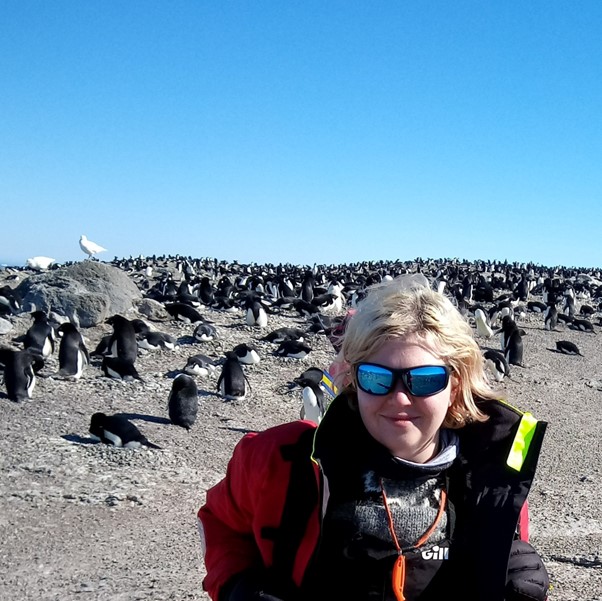
Hi, I’m Chloe Kaczvinsky, a third-year DPhil student in biology who focuses on penguin microbiomes (bacteria and other microorganisms that live in the penguin gut) and diseases in the Western Antarctic Peninsula and sub-Antarctic Islands. Most of my current work focuses on studying the links between diet, microbiome, and behaviour. I also look at diseases like avian cholera, which has been responsible for mass mortality events in Antarctic penguins. Bottom line, I basically spend a lot of time learning about penguin poo!
Marie Martine
Hertford College, DPhil Modern Languages
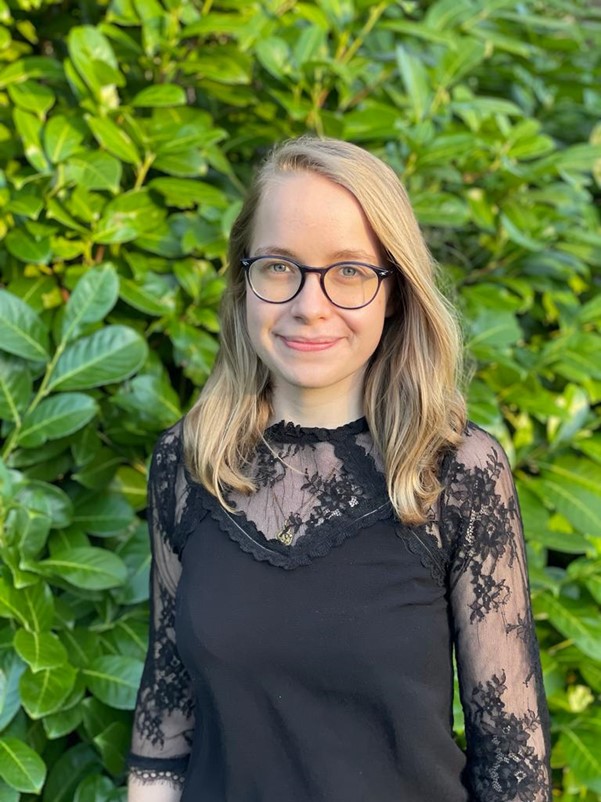
My name is Marie, I am a second-year DPhil student in Modern Languages. I did my undergrad at the universities of Paris Sorbonne (Paris IV) and Rhenish-Friedrich-Wilhelm University of Bonn in Franco-German studies. I then did my Masters in German and Comparative Literature at Bonn University and the University of St Andrews. Alongside my studies, I am part of the Europaeum scholar programme which gives PhD students the opportunity to shape European policy.
My thesis compares French, German, and Norwegian nineteenth-century women writers and aims to uncover their contributions in the literary and political debates of their time. My research analyses how women used literature to question gender norms and to deal with taboo topics, such as sexuality and mental health.
Marie has written a further piece on her research on women writers of the end of the nineteenth century in France, Germany and Norway, see below.
On the use of a ‘useless’ research topic
Not long ago, I was doing a presentation on my research which dealt with literary representations of gender and violence and someone asked me ‘But how do you end sexual violence?’. My first reaction was to panic. I wanted to say, honestly, ‘I am just a DPhil student, I don’t have the answers! Certainly not to such a broad question!’. I then improvised a response about how humanities subjects matter because they tackle difficult topics such as systemic violence and gender issues.
But I find myself coming back to this question. When I told my housemate I was taken aback by it, he told me that this particular student was in STEM and STEM people, everyone knows, are always looking for practical solutions. That seems fair, I thought, but where does that leave me and my research? Am I only here to speak about dead authors and ponder about difficult topics but never offer any solution?
I am a second year DPhil student at the Modern Languages Faculty, researching nineteenth-century women writers from France, Germany, and Norway. With a research topic such as mine, I am used to people doubting the ‘use’ of my DPhil. Who cares about nineteenth-century authors? Especially women that nobody reads anymore? From Germany or Norway? What do they have to do with us, in 21st century Britain?
Sometimes, I almost listen to those voices, and I am unsure about my contribution to society because my DPhil will certainly not cure cancer or save the environment. But then I remind myself that complex questions such as ‘ending sexual violence’ require complex answers. And those answers cannot be uncovered if we do not know about our history.
I went through three years of undergrad and two years of a master’s with a reading list consisting of 5% of women writers and even less of people of color. For a long time, I trusted my professors to make the best choices, to choose what we ‘should’ read in order to become experts in literature. I trusted that the canon, established over hundreds of years, was justified, that if people remembered those books, it was because they were worth remembering. If we did not read books by women or people of color, it was because they had no access to education and writing like middle-class European men. And if they had, their works were probably not ‘worthy’ of being read.
As I researched women writers, I realized the intricacies of canonization and I rediscovered women’s history. The active erasure of women from our textbooks and literary canon makes us miss the link between then and now. The authors of my corpus, such as Amalie Skram (Norway) or Georges de Peyrebrune (France), deal with sexual violence with a tact and a compassion that remind me of contemporary feminists. Their outrage at sexual violence demonstrates that #MeToo is not a trend, it is a demand for dignity and respect that every human being is worthy of.
Hedwig Dohm, the first German feminist who argued for women’s right to vote, is a touching symbol of feminist hopes tainted by despair. Scholars have observed how her tone in essays is ironic and hopeful for the future, while her realist fiction depicts female characters’ tragic destinies. If she did not describe independent women in her stories, it is because, to reflect reality, she had no choice but to show how women were slowly crushed by their lack of access to education and equal rights, exhausted from household duties and motherhood, with no hopes of participating in society. Hedwig Dohm was painfully conscious of being an ‘Übergangsgeschöpf’ (a being in transition): aware that feminists will slowly win the battle, but also conscious that she will never see it in her lifetime. I often wonder if our society would be the same if those women had not been forgotten, if we had listened to them. But of course, all we can do now is to rediscover and listen to them now. And avoid repeating the same mistakes by learning from them.
So how do we deal with sexual violence and other gender related issues? I still do not have a simple solution (If I had, I would have applied for a Nobel Peace Prize long ago!), but I stand by my first answer: books and words can change the world. If we keep reading broadly and listening to marginalized voices, I believe we can find solutions to complex problems.
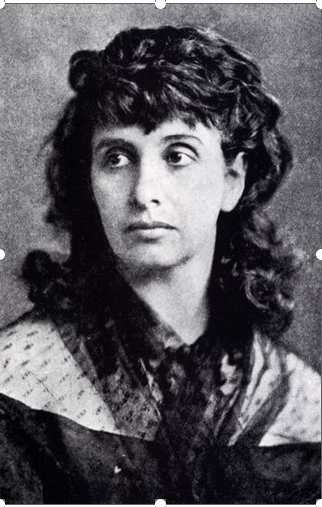


Filipa Paes
Hertford College, MCR Outreach Officer and Social-Secretary Elect, DPhil Law, University of Oxford

My name is Filipa, and I’m a legal philosopher at Hertford College! I’m in the first year of my DPhil, having graduated from my law degree from Kent Law School (UK) in 2022. My research looks into the idea of there being mistakes in rules of law, narrowing down to mistakes of linguistic meaning. I am particularly interested in ambiguous language and the mistakes it can lead to. With my DPhil, I aim to give an account of gradable expressions in law (such as, often used terms like ‘reasonable’, ‘substantial’, ‘proportional’), as this type of expressions easily give rise to ambiguity. More broadly I am interested on how words get their meaning and on how we can improve our communication with each other. I am a founding member of The Collective of Women in Legal Philosophy, and from Trinity Term I will become one of the co-convenors of the Oxford Jurisprudence Discussion Group. I’m also the Outreach Officer for the MCR this year.
Julia Olivares-Abril
Hertford College, MCR Treasurer and President-Elect, DPhil Biochemistry, University of Oxford
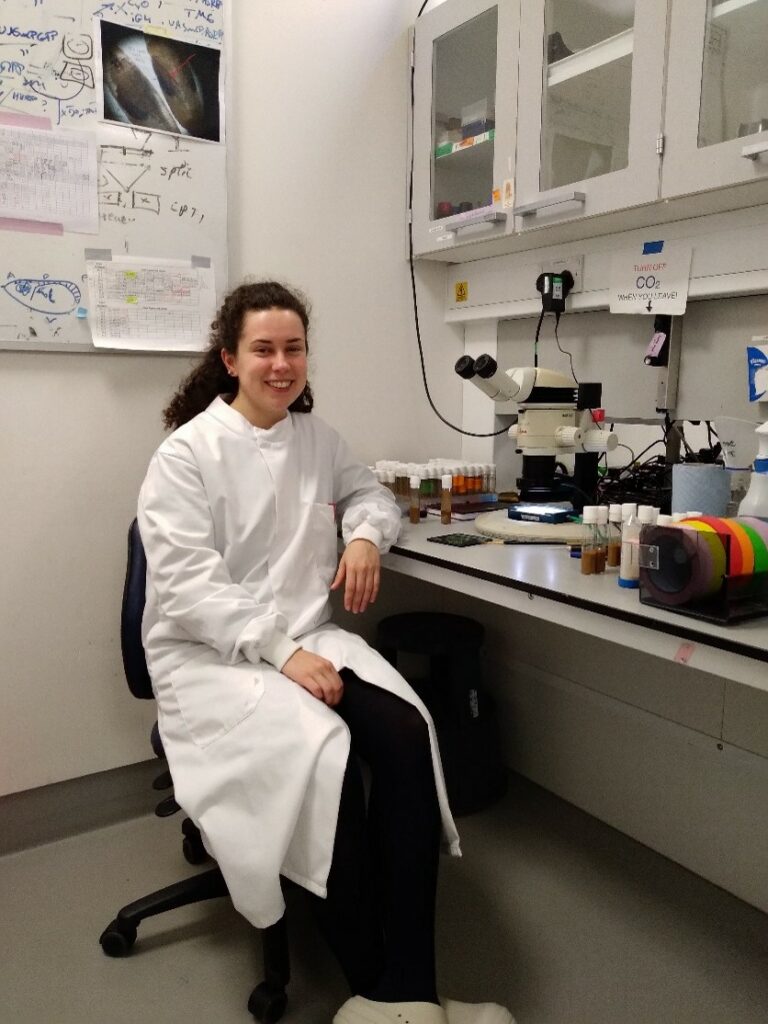
I’m Julia, a DPhil student in biochemistry. I use fruit flies (yes, fruit flies) to study how neurons manage to work so efficiently when they’re such big, long cells. A single neuron can be several centimetres long (or a couple of metres if you’re a giraffe). This means that a molecule produced in the cell body of one of your eye neurons will take up to two weeks to arrive from the brain to the eye, carried painstakingly by a motor protein. This being such a lengthy process means that the molecules involved are old and less efficient by the time they arrive to their destination. Sometimes, instead of carrying the whole molecule to the axon tip, the instructions on how to make it, the RNA, is transported instead. This is more energy efficient, because you can produce many copies of the molecule from one single RNA. However, all of this depends on the motor proteins being as efficient as possible: in some neurological diseases, particularly degenerative, having dysfunctional motor proteins can play a major role in symptoms because the neurons are not able to transport the molecules and RNA they need far from the cell body to repair themselves. My project focuses on motor protein RNA found far away from the cel body in neurons and glia, another brain cell type. I wonder whether producing motor proteins far away from the cell body helps transport be more efficient and influence the ability of neurons to work properly, develop and send signals to the muscle.
Renée Trepagnier
MPhil student in Classical Archaeology
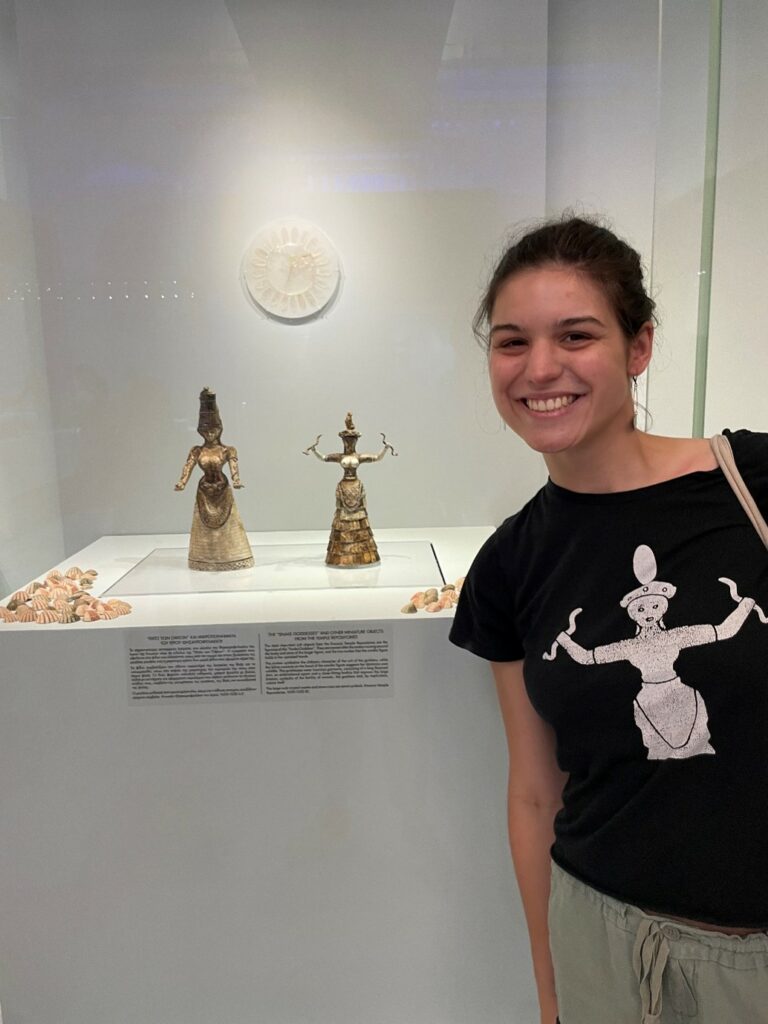
My name is Renée and I am a second year MPhil student in Classical Archaeology. I completed a BA in Classical Studies and a BS in Anthropology with a GIS Certification at Tulane University in New Orleans, Louisiana, USA. I specialize in the Aegean Bronze Age, particularly the Minoan civilization of Crete. My MPhil dissertation uses ArcGIS Pro to plot the distribution of ceramics and small finds within small buildings bordering the Palace of Knossos on Crete. I aim to understand the relationships between the Palace and the neighbouring buildings, particularly with reference to the way urban spaces change and the way groups in power control urban development. In the past, I have written extensively about the application of feminist studies and personhood theories to Minoan mortuary landscapes.
